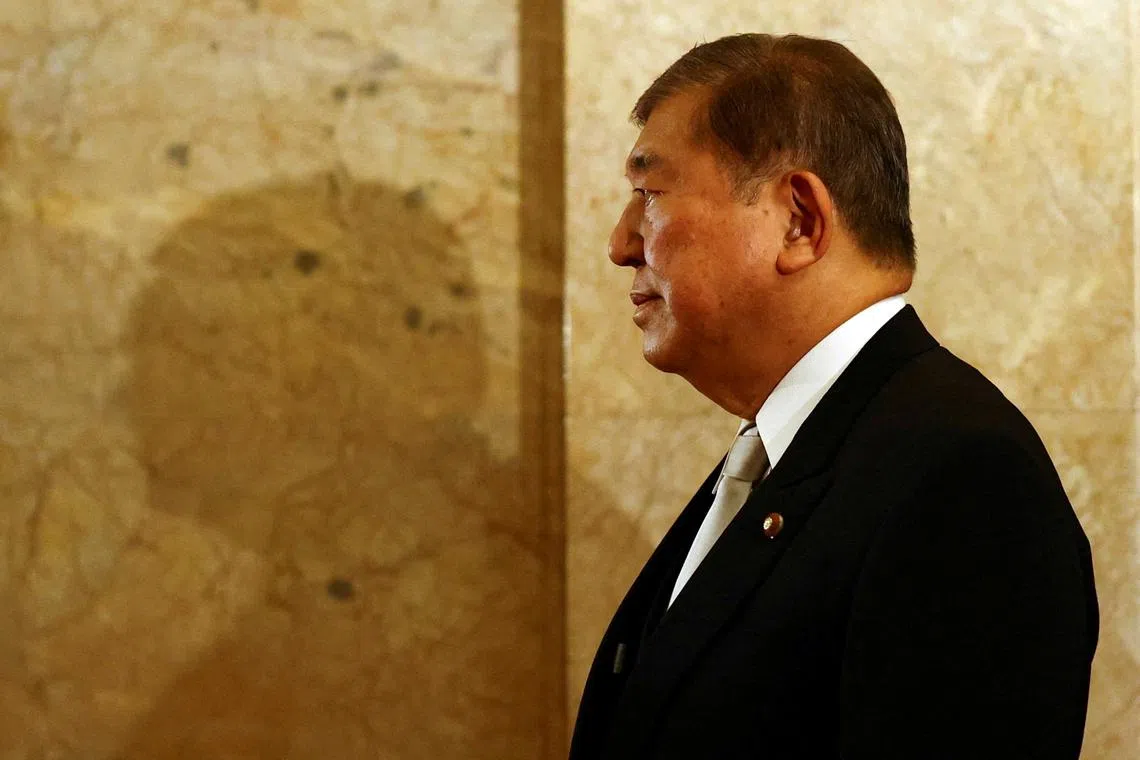Japanese PM Ishiba could face leadership challenge on Sept 8
Sign up now: Get insights on Asia's fast-moving developments

Mr Shigeru Ishiba has refused calls from within his party to step down and take responsibility for its July loss in an Upper House election.
PHOTO: REUTERS
TOKYO – Lawmakers of Japan’s ruling party will vote on Sept 8 whether to hold an extraordinary leadership election that could oust embattled Premier Shigeru Ishiba and have a significant impact on the world’s fourth-largest economy.
Concern over political uncertainty has led to a sell-off in the yen and Japanese government bonds (JGBs) this week, with the yield on the 30-year treasury hitting a record high on Sept 3.
While the policy paralysis around such a vote could add pain for an economy hit by US tariffs, markets are focusing more on the chance of Mr Ishiba’s replacement by an advocate of looser fiscal and monetary policy, such as Ms Sanae Takaichi, who has criticised the Bank of Japan’s (BOJ) interest rate hikes.
“The dominant market bet is for the Liberal Democratic Party (LDP) to hold a leadership race and for Mr Ishiba, known as a fiscal hawk, to lose his job,” said Mr Katsutoshi Inadome, a senior strategist at Sumitomo Mitsui Trust Asset Management.
“We’ll likely see further selling in Japanese government bonds as whoever succeeds Mr Ishiba probably will be more open to loosening fiscal policy than him.”
Mr Ishiba has refused calls from within the LDP to step down and take responsibility for the party’s loss in the July Upper House election.
Staying in power, however, has become increasingly hard for him. Having lost a majority in both Houses of Parliament, his ruling coalition needs opposition support to pass legislation.
Wary of being attached to the unpopular Premier, opposition parties have refused to cooperate. Even some of Mr Ishiba’s Cabinet members are now calling for the choice of a new party leader.
Party rules require at least half the LDP members to request holding the race, which could follow in September or October.
Such a contest could delay Parliament’s passage of an expected supplementary budget aimed at cushioning the blow to households from rising living costs.
Economic support package
Mr Ishiba on Sept 5 told reporters that he plans to compile in autumn a package of measures to support the economy.
Asked whether he would step down, he said: “All I can say is that my government will fulfil its responsibility to the public.”
Eurasia Group gave odds of 60 per cent that Mr Ishiba would not survive.
“Mr Ishiba’s poor performance as party leader in Lower and Upper House elections and events in recent days, including former prime minister Taro Aso announcing his support for the special election, have turned the tide against Mr Ishiba,” said Mr David Boling, director of Japan and Asian Trade at Eurasia.
That puts the focus on his potential successor.
While the LDP lacks a majority in Parliament, its leader would still be the favourite to become the next prime minister due to a fragmented opposition.
The choice could affect not just the scale of fiscal stimulus, but also the timing of the BOJ’s next interest rate hike, analysts say.
Front runners include Mr Shinjiro Koizumi, 44, the charismatic Agriculture Minister who is popular with the public but whose views on economic policy are unknown.
Ms Takaichi, who represents the party’s right wing, is also seen by some analysts as a strong candidate
While several other candidates are seen as being in the fray, Ms Takaichi stands out for her vocal opposition to BOJ rate hikes and calls to ramp up spending to underpin a fragile economy.
After ending a decade-long massive stimulus programme in 2024, the BOJ raised interest rates to 0.5 per cent in January on the view that Japan was on the cusp of sustainably meeting its inflation target of 2 per cent.
Most economists polled by Reuters expect the central bank to raise rates again in 2025, with some betting on a hike in October.
“Under Ms Takaichi, fiscal discipline will be out the window,” Mr Inadome said. “Markets still remember the time she made it to the run-up in September and triggered huge selling in JGBs.” REUTERS


